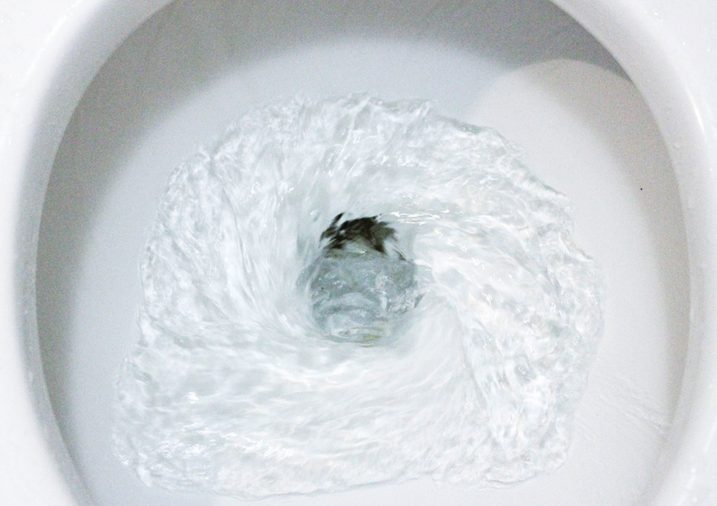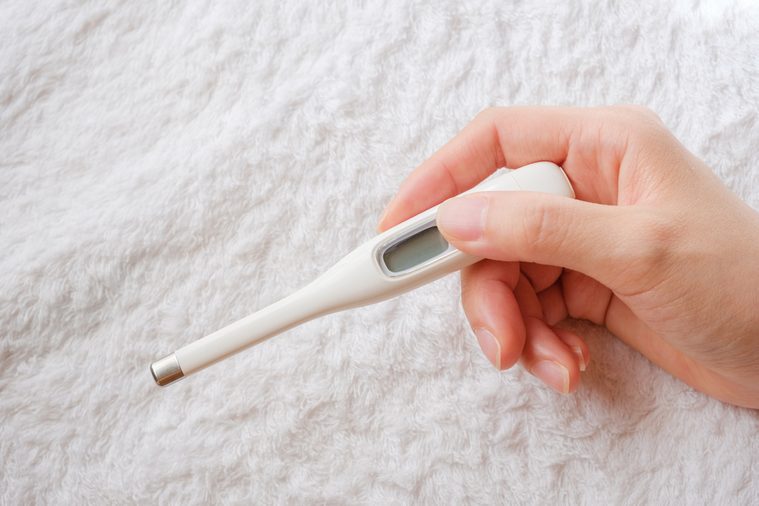
Sweating
Contrary to popular belief, food poisoning doesn’t immediately send you running to the bathroom clutching your stomach after consuming a bite of contaminated food. However, breaking out in a sweat can be one of the early warning signs of food poisoning—and an indication that things are about to get much worse. If the fever and perspiration make you think you have a stomach bug, try to remember if you ate something suspicious in the past few days. It can be easy to confuse food poisoning with gastroenteritis, aka stomach flu: Here are some important differences between the signs of food poisoning and a stomach bug.

Gas
Stomach cramps and flatulence are good signs that your stomach is roiling with a food bug, according to the Mayo Clinic. They often precede a frantic rush to the bathroom. If abdomen pain has you doubled over and hobbling for the toilet, it’s an accurate—and unfortunate—sign that bad bacteria are at work in your gut. Here’s what to do if you accidentally eat mold.

Nausea and vomiting
While nausea and vomiting are hallmark signs of food poisoning, how soon the symptoms show up will depend on which strain of bacteria made you sick. For example, Listeria, commonly found in deli meats, hummus, raw milk, and soft cheeses, can trigger symptoms anywhere from three to 70 days after exposure, while Salmonella—most notably contaminating eggs, meat (especially poultry), and raw fruits and veggies—can cause symptoms to appear within 12 to 72 hours, says Sandra Elizabeth Ford, MD, district health director of the DeKalb County Board of Health in Decatur, Georgia. Here’s the real truth behind common food poisoning myths.

Diarrhea
Diarrhea is another one of the more obvious signs of food poisoning, but how do you tell if it’s caused by a stomach virus or by contaminated food? Clues can be found in the type of diarrhea. Norovirus is the most common cause of stomach flu, and it can spread via food handled by a contaminated individual. It causes watery diarrhea, most commonly in adults. Meanwhile, E. coli (known for contaminating beef and raw vegetables) and Campylobacter (often found in undercooked poultry and contaminated water) can both cause bloody diarrhea. “If bloody diarrhea or any other symptoms are severe, seek medical attention,” says Dr. Ford. Symptoms may last for one to ten days, depending on what you were infected with. Here are 10 more reasons you might have chronic diarrhea.

Fever
Some types of bacteria, such as Listeria and Campylobacter, can cause a fever, though it’ll likely be accompanied by digestive symptoms. If fever persists for more than 48 hours, call a doctor, says Dr. Ford.

Confusion
If your brain starts to feel fuzzy, don’t ignore it—Listeria can cause this symptom, and it might not appear for two months or more after you’ve been contaminated. You may also notice a stiff neck or overall weakness are also signs of food poisoning. Seek medical attention for any unexplained mental changes, Dr. Ford cautions. Find out which food causes the most food poisoning every year.

Dehydration
If you find yourself dealing with symptoms that are also signs of food poisoning, the first thing to do is hydrate. “Drink lots of water or electrolyte-fortified solutions such as Pedialyte or Gatorade,” says Rais Vohra, MD, medical director of the California Poison Control System, Fresno/Madera Division in Fresno, California. Avoid sugary, caffeinated, and alcoholic beverages because they can be dehydrating, he adds. Nibble small bites of bland foods like bananas, white rice, or toast—also known as the BRAT diet.

What foods should I look out for?
You can get food poisoning from pretty much anything, but common culprits include raw or undercooked meat, raw fruits and veggies that haven’t been washed thoroughly (or have been cross contaminated by raw meat during meal prep), unpasteurized milk, and anything left out of the fridge for lengthy periods of time. Make sure you know about these 14 foods you had no idea could give you food poisoning.

How can I protect myself?
There’s only so much you can do when it comes to eating out at restaurants or eating prepared foods from the grocery store. But when you’re cooking at home, it’s important to practice safe food handling, including keeping your work space and utensils clean (especially after handling raw meat), thoroughly washing raw produce, storing food at proper temperatures, monitoring expiration dates, and being mindful of how long you keep leftovers. If you want to play it extra safe, avoid these things food poisoning experts never eat.